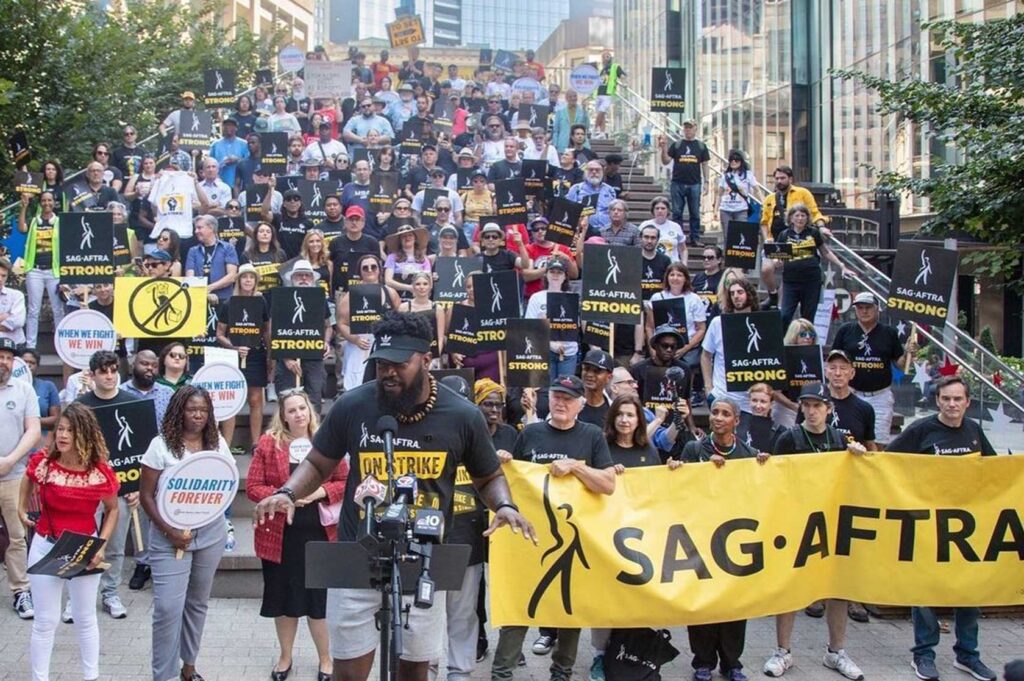
Actress Karen Ceesay published a Facebook post on July 18, four days after the SAG-AFTRA strike began. In this post she revealed her first residual checks from the television shows “Black Lightning” and “Greenleaf” were between $3,000 and $4,000 each. By her own admission, these shows were “moderately popular.” However, her first residual check from “Stranger Things,” one of Netflix’s most watched shows, was a mere $325. During a phone interview, Ceesay said she still has not received a residual check from the last season of “Stranger Things,” which aired in 2022.
Residual checks are one of many issues that led to a negotiating standstill on July 13 between the Screen Actors Guild-American Federation of Television and Radio Artists (SAG-AFTRA) and the Alliance of Motion Picture and Television Producers (AMPTP). The AMPTP is an organization representing more than 350 television and film production companies, including Netflix and Disney. Before SAG-AFTRA’s strike, on May 2 the Writers Guild of America (WGA) went on strike against the AMPTP.
Without screenwriters and performers, Hollywood has come to a halt.
The effects of the strike have hit home in New England. Productions that were slated for the area are either on hold or canceled, leaving local performers in limbo.
Andrea Lyman, an actress and president of the SAG-AFTRA New England chapter, said on a call that another issue, in addition to demands for increased residual checks and more transparency from streaming services, is generative AI.
Lyman explained that generative AI allows production companies to scan actors’ bodies while they’re employed for one production. Companies can then save the full body scan of said actor and use it in future productions, in perpetuity, without the actor’s consent and without pay.
Lyman said she’s been scanned before and the risks were not explained to her. AMPTP did not respond to requests for comment.
For Lyman and many of SAG-AFTRA’s approximately 160,000 members nationwide this is an issue of ethics. As a result, 98% of members voted to go on strike, knowing they would be out of work, forgoing their incomes, and likely unable to make enough to qualify for union health insurance. A member must make at least $26,470 in a four-quarter period to qualify for health coverage, and on average about 85% of members do not qualify for health insurance.
In July, the CEO of The Walt Disney Company, Bob Iger, told CNBC, “We managed, as an industry, to negotiate a very good deal with the directors’ guild that reflects the value that the directors contribute to this great business. We wanted to do the same thing with the writers, and we’d like to do the same thing with the actors … There’s a level of expectation that they have, that is just not realistic. And they are adding to the set of the challenges that this business is already facing that is, quite frankly, very disruptive.”
Iger’s reported salary is about $27 million a year, which includes his base salary, bonus and stock options.
One anonymous studio executive, speaking to Deadline, described the plan to attempt to break the WGA.
“The end game,” the executive said, “is to allow things to drag on until union members start losing their apartments and losing their houses.”
Daniel Washington, a native Bostonian and SAG-AFTRA member, said he’s been checking in on friends and colleagues. They are rationing their groceries due to a lack of funds and rising inflation. Washington does DoorDash work to make ends meet.
“People are stepping up like you wouldn’t believe,” Lyman said of the way SAG-AFTRA New England’s 4,000 members are supporting one another. Members are sharing resources like the Entertainment Community Fund, a nonprofit helping those in entertainment withstand financial downturns. Lyman has both used and contributed to this fund during her decades-long tenure as a performer. Members also host Zoom meetings and calls to boost morale, trade tips and collaborate on their independent productions to maintain their craft as the strike continues without an end in sight.
Washington spoke at a Labor Day rally in the Boston Common, encouraging people not to get tired. He said it’s AMPTP’s goal to break down SAG-AFTRA and WGA members, but that they won’t, since actors are stubborn — and used to job insecurity.
“We know how to work multiple side hustles to make money,” he said. The strike, he added, is a “life changing battle, because it’s the first public battle against AI.”
“The goal isn’t to beat these guys,” he said. “The goal is to change the machine and create a better one.”







